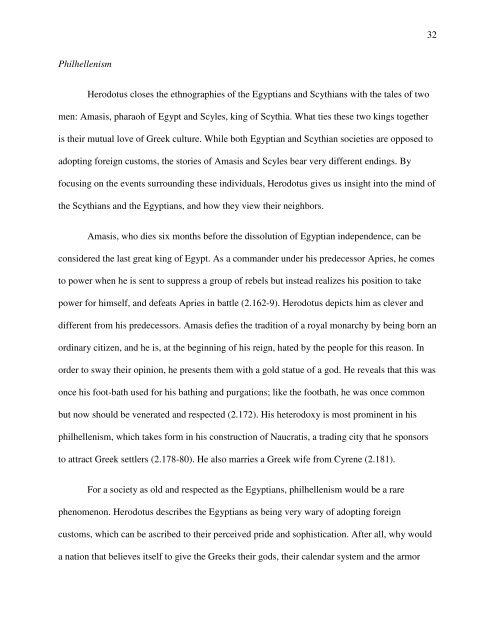The Old and the Restless - The Egyptians and the Scythians in Herodotus' Histories by Robert J. Hagan
You also want an ePaper? Increase the reach of your titles
YUMPU automatically turns print PDFs into web optimized ePapers that Google loves.
32<br />
Philhellenism<br />
Herodotus closes <strong>the</strong> ethnographies of <strong>the</strong> <strong>Egyptians</strong> <strong>and</strong> <strong>Scythians</strong> with <strong>the</strong> tales of two<br />
men: Amasis, pharaoh of Egypt <strong>and</strong> Scyles, k<strong>in</strong>g of Scythia. What ties <strong>the</strong>se two k<strong>in</strong>gs toge<strong>the</strong>r<br />
is <strong>the</strong>ir mutual love of Greek culture. While both Egyptian <strong>and</strong> Scythian societies are opposed to<br />
adopt<strong>in</strong>g foreign customs, <strong>the</strong> stories of Amasis <strong>and</strong> Scyles bear very different end<strong>in</strong>gs. By<br />
focus<strong>in</strong>g on <strong>the</strong> events surround<strong>in</strong>g <strong>the</strong>se <strong>in</strong>dividuals, Herodotus gives us <strong>in</strong>sight <strong>in</strong>to <strong>the</strong> m<strong>in</strong>d of<br />
<strong>the</strong> <strong>Scythians</strong> <strong>and</strong> <strong>the</strong> <strong>Egyptians</strong>, <strong>and</strong> how <strong>the</strong>y view <strong>the</strong>ir neighbors.<br />
Amasis, who dies six months before <strong>the</strong> dissolution of Egyptian <strong>in</strong>dependence, can be<br />
considered <strong>the</strong> last great k<strong>in</strong>g of Egypt. As a comm<strong>and</strong>er under his predecessor Apries, he comes<br />
to power when he is sent to suppress a group of rebels but <strong>in</strong>stead realizes his position to take<br />
power for himself, <strong>and</strong> defeats Apries <strong>in</strong> battle (2.162-9). Herodotus depicts him as clever <strong>and</strong><br />
different from his predecessors. Amasis defies <strong>the</strong> tradition of a royal monarchy <strong>by</strong> be<strong>in</strong>g born an<br />
ord<strong>in</strong>ary citizen, <strong>and</strong> he is, at <strong>the</strong> beg<strong>in</strong>n<strong>in</strong>g of his reign, hated <strong>by</strong> <strong>the</strong> people for this reason. In<br />
order to sway <strong>the</strong>ir op<strong>in</strong>ion, he presents <strong>the</strong>m with a gold statue of a god. He reveals that this was<br />
once his foot-bath used for his bath<strong>in</strong>g <strong>and</strong> purgations; like <strong>the</strong> footbath, he was once common<br />
but now should be venerated <strong>and</strong> respected (2.172). His heterodoxy is most prom<strong>in</strong>ent <strong>in</strong> his<br />
philhellenism, which takes form <strong>in</strong> his construction of Naucratis, a trad<strong>in</strong>g city that he sponsors<br />
to attract Greek settlers (2.178-80). He also marries a Greek wife from Cyrene (2.181).<br />
For a society as old <strong>and</strong> respected as <strong>the</strong> <strong>Egyptians</strong>, philhellenism would be a rare<br />
phenomenon. Herodotus describes <strong>the</strong> <strong>Egyptians</strong> as be<strong>in</strong>g very wary of adopt<strong>in</strong>g foreign<br />
customs, which can be ascribed to <strong>the</strong>ir perceived pride <strong>and</strong> sophistication. After all, why would<br />
a nation that believes itself to give <strong>the</strong> Greeks <strong>the</strong>ir gods, <strong>the</strong>ir calendar system <strong>and</strong> <strong>the</strong> armor
















